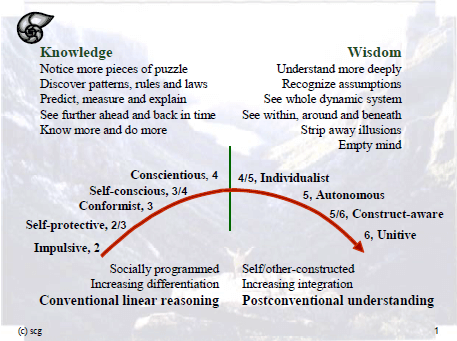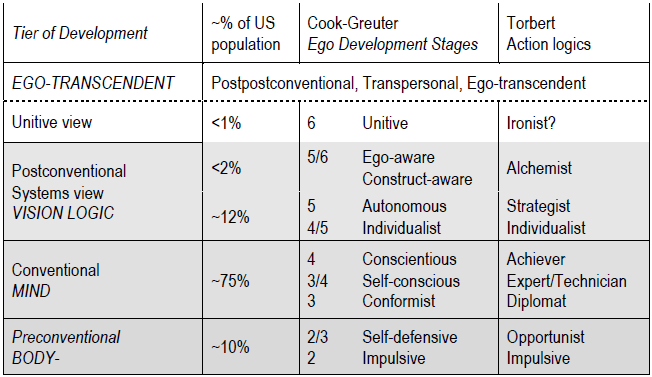Dr. Susanne Cook-Greuter: Nine Levels of Ego Development
Dr. Susanne Cook-Greuter’s model identifies nine levels of ego development. The levels range from “Impulsive” to “Unitive.” Her work builds upon decades of Ego Development Theory (EDT) research.
Earlier research in EDT focused on early and middle stages. Cook-Greuter recognized the need to explore the advanced stages of human development. As fewer people reached these levels, there was less research available.
Her research used Sentence Completion Tests (as common in EDT research – Piaget, Loevinger, Kegan, Rooke & Torbert, and many others). She supplemented those with in-depth interviews with people at the higher stages.
Her work blends ideas from Western and Eastern philosophies.
On the Western side, she explores the ideas of psychological development. This emphasizes the journey towards greater self-awareness and individual completeness.
In contrast, Eastern philosophies emphasize the impermanent and interconnected nature of the self. They encourage us to see beyond our individual identity.
Her work shows that as people grow, they can both improve themselves and also move beyond limited ideas of who they are.

Let’s dive deeper into each stage:

Preconventional
The Preconventional tier is rarely encountered in professional adults. This way of seeing the world is usually navigated in childhood. However, the memories from this stage are stored in our subconscious mind and body. These memories can be triggered in times of extreme stress.
Impulsive
The Impulsive stage focus is on immediate needs and desires. It is often expressed in straightforward language like “I want” and “mine.” This stage is most commonly observed in children who are navigating their emerging sense of self. It’s rare to encounter individuals at this stage in a corporate setting, as it represents a very early level of ego development. People at this stage have limited understanding of societal rules and give into their immediate impulses.
Self-Defensive (Opportunist)
The Self-Defensive or Opportunist stage focus is on personal advantage. They have a limited understanding of the consequences of actions. They tend to be hyper-vigilant, often feeling that it’s “me against the world.” While they begin to recognize social rules, these are often followed only for immediate gain or to avoid punishment. Relationships can be volatile. Individuals often project their own fears and hostilities onto others. This stage is seldom seen in mature corporate settings. They often rely on blaming others and external circumstances to protect their self-esteem.
(Note: The tendency to blame others is common until one reaches the post-conventional stages. At these advanced levels, individuals understand that external factors are not responsible for their internal state of mind.)
Conventional
The Conventional tier includes the Conformist (Diplomat), Self-Conscious (Expert), and Conscientious (Achiever) stages. Research indicates that approximately 80% of adults operate within these stages. These stages are built upon conforming to social norms, mastering technical skills, and achieving measurable goals, respectively. Society and institutions generally support and reward the Achiever stage as the epitome of adult development. These stages collectively form the backbone of what is considered rational, effective, and socially acceptable behavior in Western culture.
Conformist (Diplomat)
The Conformist or Diplomat stage centers on adhering to societal norms and expectations. Individuals at this stage seek approval and validation from their social circles. They will often conform to the rules without questioning their validity. They view the world as clear categories of right and wrong. They often lack nuanced understanding of complex situations. They look to authority figures for guidance and generally avoid conflict. They aim for harmony in their interactions. Their language can be overly positive and full of platitudes. It’s important to be ‘nice.’ They can take a second person perspective.
Self-Conscious (Expert)
The Self-Conscious or Expert stage focuses on the achievement of personal goals. Individuals at this stage are highly competent and deeply committed to excelling in their chosen fields. They cultivate their own internal guidelines for decision-making. While they still value external validation, there’s an increasing emphasis on self-validation. They feel they have “figured it all out.” A strong sense of right and wrong and what should and shouldn’t be. In speaking with others, they will use the “yes, but” wording to one-up the others’ thoughts. They ask many questions and accumulate the facts.
Conscientious (Achiever)
The Conscientious or Achiever stage is the target stage for Western Culture. The education system is set up in a way to produce adults with this level of mental capacity. Operations and rationality are at their peak. Always looking for the root causes and reasons. However, they can ‘agree to disagree’ with others as a compromise. They are goal-oriented. In a corporate setting, this is where you see people managing a team. They ask, “What causes others to be what they are and to behave in certain ways?” Then how can I use that knowledge of the other to help us achieve our goals. They are willing to take risks and to fail to a degree people at earlier stages cannot. The drive to succeed at this stage can lead to being overworked. Immersed in their tasks and projects, they rarely pause to contemplate the present or reflect on the broader aspects of life. Known for their intellectual skepticism towards things until they are ‘proven’ to them.
Post-Conventional
The Post-Conventional tier includes the Individualist, Autonomous (Strategist), and Construct-aware (Alchemist) stages. This tier is not as common with approximately 15% of adults. The majority of the 15% are in the Individualist stage, with less than 2% in the highest Construct-aware stage. The Post-Conventional tier represents a leap in cognitive complexity, emotional intelligence, and the understanding of interconnected systems. The meaning of objects or events is not fixed but depends on one’s relative position and interpretation. They recognize that their internal states are not solely the result of external circumstances. They start to seek deeper, more authentic experiences and relationships. Its manifestations are often impactful, leading to transformative leadership, innovations, and social change.
Individualist
The Individualist stage marks a significant shift towards post-conventional thinking. They realize that the interpretation of events varies depending on the observer’s viewpoint. Transition from a focus on rational, objective analysis to a more nuanced approach that incorporates feelings and context. No longer concerned with finding absolute truths. Beginning sense of the futility of framing things in ‘right’ and ‘wrong.’ They embrace relativism and understand that everything is interrelated.
They question societal norms and roles they once adhered to. Aim to redefine themselves based on their own experiences rather than external expectations. They turn inwards to explore their unique gifts or pursue personal inquiries.
Paradoxes are no longer something to solve but accepted and appreciated. A shift from “doing” to “being and feeling.” More focus on the present rather than being solely future-oriented.
Their language reflects cognitive complexity, containing contrasting ideas. They use “and” instead of “or” or “but,” indicating an acceptance of multiple realities. The heightened self-awareness allows for greater empathy and respect for individual differences. This can sometimes lead to endless discussions without clear resolutions in group settings.
Autonomous (Strategist)
The Autonomous stage has an expanded fourth-person perspective. They integrate experiences into broader worldviews and lifetime contexts. They excel in identifying systemic patterns and long-term trends. Others recognize their strategic capacity. Unlike Individualists, Autonomous individuals can integrate conflicting aspects of themselves without despair. They understand that each individual is responsible for creating their own lifestyle and achieving self-fulfillment. Seeking coaching, therapy, advice, or consulting is not viewed as a sign of weakness but as a necessity for dealing with inner conflict.
They create meaningful lives for themselves and others by understanding that meaning itself is a human interpretation. They comfortably navigate paradox and ambiguity. Less cynical than Individualists, moving from relativism to personal commitment and responsibility. Emotionally attuned, they acknowledge both positive and negative traits in themselves and others.
Language is complex, reflecting a broad scope of thought and tolerance for ambiguity. Needing time for solitude, they focus on self-actualization and personal growth. They may become impatient with others who resist development. They are often coaches and effective executives and leaders. Driven by a strong desire to help others achieve their fullest potential. The core concern is the fear of not fulfilling their unique potential.
Construct-aware (Alchemist)
The Construct-Aware stage, or Alchemist, is a profound level of self-awareness and intricate understanding of reality. They make up less than 2% of the adult population. They recognize the limitations of language, concepts, and even the ego as human-made constructs that fail to encapsulate the full essence of reality. This realization leads to an existential struggle, as they grapple with the constraints of rational thought and language. They often find themselves misunderstood due to the complexity of their ideas. They realize that the “ego” has functioned both as a central processing unit for all stimuli and as a central point of reference and self-identity.
They report more often than earlier stages that they are watching or witnessing the parades of thoughts and feelings come and go without trying to direct them.
In their pursuit of understanding, they equally value rational and non-rational sources of knowledge, such as intuition and bodily sensations. Their communication style is highly empathic. They are skillful at offering transformational feedback and tailored interactions to match the recipient’s level of comprehension.
Language at this stage is often filled with paradox, ambiguity, and metaphor. They reflect an understanding that words are mere pointers to a complex, multi-layered reality that is ever-changing.
They see the value in all stages of human consciousness. They go beyond viewing therapy, coaching, or consulting as mere tools for resolving inner conflict, recognizing their potential as transformative catalysts for systemic change.
Unitive (Ironist)
The Unitive stage, also known as the Ironist stage, has an expansive understanding of human existence. A sense of interconnectedness with all forms of life is deeply ingrained in them. The ego is transcended. They act more as witnesses to experiences rather than active participants.
The Unitive perspective harmonizes the concept of individuality with a sense of belonging. These are seen as ever-changing aspects of a unified reality. This broad view extends to their understanding of morality as well.
Unitive individuals often serve as catalysts in the lives of others. They do this through their unique way of being. They do not rely on overt actions or words to influence. Instead, their influence is subtle and often indirect.
They are not confined to rational thought. Reality is fluid and interconnected. It is seen as the creative ground of unified consciousness. They value every manifestation of life. They recognize the limitations that come with human constructs and boundaries.
These individuals radiate humility. Their humility exists alongside their complex understanding of life. Their language reflects this complex worldview; weaving together a variety of topics and concerns. This is possible due to their expanded mental and emotional space.
The Unitive stage signifies the culmination of individual growth. A person’s unique identity becomes harmonized with a collective evolutionary process. This equates to Enlightenment.
I’ll leave you with what Dr. Cook-Greuter said in the Summary at the end of her paper:
“Much freedom is gained when people realize the essential inter-connectedness of all phenomena and the constructed aspects of boundaries, objects, our self-identities and our stories about life and nature. Much suffering is alleviated when the automatic habits of mind and heart are unlearned and uncoupled from memory (what was) and desires (what ought to be) and replaced by mindful, non-evaluative attention to what is – now.”
Where are you and where do you want to go?
I highly recommend reading Dr. Cook-Greuter’s paper titled “Ego Development: Nine Levels of Increasing Embrace.” She goes into great detail about each level. The summary above does not do it justice.
As you read through the paper, you can highlight the sentences that describe your current level of thinking. Then highlight in another color the sentences you want to get to. Alternatively, you can also note the sentences that you do not want to believe anymore as you can see where they limit you.
The goal here is deeper self-awareness of where you are and where you want to go.
NEXT
Richard Barrett’s Seven Levels of Leadership (Coming Soon)


